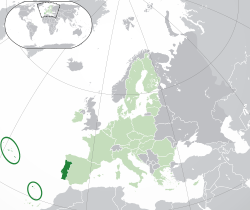
Back Португалиа Abkhazian Portugéh ACE Португалие ADY Portugal Afrikaans Portugal ALS ፖርቱጋል Amharic Portugal AMI Portugal AN Portugal ANG Pọtugalu ANN
Portuguese Republic República Portuguesa (Portuguese) | |
|---|---|
| Motto: Esta é a ditosa Pátria minha amada ("This is my blissful beloved homeland") | |
| Anthem: A Portuguesa ("The Portuguese") | |
Location of Portugal (dark green) – on the European continent (green & dark grey) | |
| Capital and largest city | Lisbon 38°46′N 9°9′W / 38.767°N 9.150°W |
| Official languages | Portuguese (also in national language) Portuguese Sign Language |
| Recognised regional languages | Mirandese[note 1] |
| Ethnic groups |
|
| Religion (2011) |
|
| Demonym(s) | Portuguese |
| Government | Unitary semi-presidential republic[4] |
| Marcelo Rebelo de Sousa | |
| Luís Montenegro | |
| Legislature | Assembly of the Republic |
| Establishment | |
| 868 | |
| 1095 | |
| 24 June 1128 | |
• Kingdom | 25 July 1139 |
| 1 December 1640 | |
| 23 September 1822 | |
• Republic | 5 October 1910 |
| 25 April 1974 | |
| 25 April 1976[note 3] | |
| 1 January 1986 | |
| Area | |
• Total | 92,212 km2 (35,603 sq mi)[5] (109th) |
• Water (%) | 1.2 (as of 2015)[6] |
| Population | |
• 2021 census | |
• Density | 112.2[7]/km2 (290.6/sq mi) |
| GDP (PPP) | 2022 estimate |
• Total | |
• Per capita | |
| GDP (nominal) | 2022 estimate |
• Total | |
• Per capita | |
| Gini (2019) | medium |
| HDI (2019) | very high · 38th |
| Currency | Euro (€) (EUR) |
| Time zone | UTC (WET) UTC−1 (Atlantic/Azores) |
• Summer (DST) | UTC+1 (WEST) UTC (Atlantic/Azores) |
| Note: Mainland Portugal and Madeira use WET/WEST, the Azores are 1 hour behind. | |
| Date format | dd/mm/yyyy |
| Mains electricity | 230V - 50Hz |
| Driving side | Right |
| Calling code | +351 |
| ISO 3166 code | PT |
| Internet TLD | .pt |
| |
Portugal is a country in Southern Europe on the Iberian Peninsula. It is the westernmost country of Europe and part of the Mediterranean area. It is bordered by the Atlantic Ocean to the west and south and by Spain to the north and east. Its capital city is Lisbon. It has been a member of the European Union since 1986.
Portugal was under a dictatorship between 1926 and 1974 called Estado Novo. This dictatorship was ended by a peaceful revolution called the Carnation Revolution. The Portuguese economy has been very good since then although it was hit hard by the recession of 2007-2008.
It once had an empire called the Portuguese Empire, and was a powerful maritime nation from the 1500s to the 1800s, being the tenth-largest empire, with a maximum land area of 10.4 million km² which included Brazil, Angola, Mozambique, Guinea-Bissau, East Timore, São Tomé and Príncipe, and Portuguese Ceylon (Sri Lanka), as well as Macau in China (until 2002).
Portugal is a popular holiday destination but is sometimes overlooked in favour of larger countries like France, Spain and Italy. The Algarve region in the south and the capital Lisbon are the most popular destinations.
The country has a national football team. Portugal won the Eurovision Song Contest in 2017, and hosted the contest the following year.
- ↑ 1.0 1.1 "Reconhecimento oficial de direitos linguísticos da comunidade mirandesa (Official recognition of linguistic rights of the Mirandese community)". Centro de Linguística da Universidade de Lisboa (UdL). Archived from the original on 18 March 2002. Retrieved 2 December 2015.
- ↑ 2.0 2.1 The Euromosaic study, Mirandese in Portugal, europa.eu – European Commission website. Retrieved January 2007. Link updated December 2015
- ↑ 3.0 3.1 "Censos 2021 - Divulgação dos Resultados Provisórios". Statistics Portugal - Web Portal. 16 December 2021. Retrieved 16 December 2021.
- ↑ Constitution of Portugal, Preamble:
- ↑ (in Portuguese)"Superfície Que municípios têm maior e menor área?". Pordata. Archived from the original on 2 April 2022. Retrieved 17 November 2020.
- ↑ "Surface water and surface water change". Organisation for Economic Co-operation and Development (OECD). Retrieved 11 October 2020.
- ↑ "PORDATA - Population density, according to Census". Archived from the original on 2020-11-30. Retrieved 2022-02-22.
- ↑ 8.0 8.1 8.2 8.3 "Report for Selected Countries and Subjects – Portugal". International Monetary Fund. 2021. Retrieved 12 October 2021.
- ↑ "Gini coefficient". Portugal: PORDATA. Archived from the original on 24 May 2020. Retrieved 8 June 2019.
- ↑ "Human Development Report 2020" (PDF). United Nations Development Programme. 15 December 2020. Retrieved 15 December 2020.
<ref group=note> tags on this page, but the references will not show without a {{reflist|group=note}} template (see the help page).



